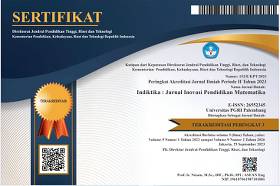PENGEMBANGAN SOAL HIGHER ORDER THINKING SKILLS BERBASIS BUDAYA JAWA TIMUR UNTUK MENGUKUR PENALARAN SISWA SD
DOI:
https://doi.org/10.31851/indiktika.v2i1.3395Abstract
Â
Penelitian ini bertujuan untuk menghasilkan soal matematika tipe HOTS yang valid dan praktis yang dapat digunakan untuk mengukur penalaran siswa. Pengembangan soal HOTS ini dibuat dengan menggunakan beberapa konteks budaya dari berbagai daerah Jawa Timur, diantaranya daerah Nganjuk, Jawa, Malang, dan Madura. Jenis penelitian yang digunakan adalah penelitian pengembangan. Model yang digunakan adalah model pengembangan tipe formative research Tessmer, yaitu preliminary dan tahap formative evaluation yang terdiri dari self evaluation, prototyping (expert review, one-to-one, dan small group), serta field test. Subjek pada one to one sebanyak 3 siswa kelas V Imam Bonjol, subjek pada small group sebanyak 6 siswa kelas V Imam Bonjol, dan subjek pada field test sebanyak 28 siswa kelas V Diponegoro SD Sunan Giri Ngebruk. Berdasarkan hasil penelitian, diperoleh instrumen tes yang valid, dengan kriteria tinggi yaitu 4,33 dan reliabel dengan kriteria tinggi yaitu nilai 0,85. Hasil rata-rata tingkat kesukaran soal 0,67 dengan kategori sedang, dan hasil rata-rata daya pembeda 0,34 dengan kategori baik. Dari field test, hasil rata-rata kemampuan penalaran siswa 67,85 dengan kategori cukup., terdapat 7 siswa (25%) memiliki kemampuan penalaran sangat baik, 7 siswa (25%) memiliki kemampuan penalaran baik, 3 siswa (10,71%) memiliki kemampuan penalaran cukup, dan 11 siswa (39,29%) memiliki kemampuan penalaran kurang.
Â
Kata kunci : pengembangan, soal tes, kemampuan penalaran
Â
ABSTRACT
This study aims to produce mathematical problems that are valid and practical HOTS types that can be used to measure student reasoning. The development of the HOTS question was made using several cultural contexts from various regions of East Java, including the Nganjuk, Java, Malang and Madura regions. This type of research used is development research. The model used is the Tessmer formative research type development model, which is the preliminary and formative evaluation stage which consists of self evaluation, prototyping (expert review, one-to-one, and small groups), and field tests. Subjects in one to one were 3 students in grade V Imam Bonjol, subjects in small group were 6 students in grade V Imam Bonjol, and subjects in the field test were 28 students in grade V Diponegoro SD Sunan Giri Ngebruk. Based on the results of the study, obtained a valid test instrument, with a high criterion of 4.33 and reliable with a high criterion of 0.85. The average results of the level of difficulty of 0.67 in the medium category, and the average yield of 0.34 in the good category. From the field test, the average results of students reasoning ability 67.85 with enough categories. There are 7 students (25%) have very good reasoning abilities, 7 students (25%) have good reasoning abilities, 3 students (10.71% ) have sufficient reasoning ability, and 11 students (39.29%) have less reasoning ability.
Keywords : development, test questions, reasoning ability
References
Anderson, L.W., and Krathwohl, D.R. 2001. A Taxonomy for Learning, Teaching, and Assesing; A revision of Bloom’s Taxonomy of Education Objectives. New York: Addison Wesley Lonman Inc.
Arikunto, Suharsimi. 2010. Prosedur Penelitian Suatu Pendekatan Praktik. Jakarta: Rineka Cipta.
Dewi, Nastitisari. 2016. Analisis Kemampuan Berpikir Kompleks Siswa Melalui Pembelajaran Berbasis Masalah Berbantuan Mind Mapping. Jurnal Edu Sains, Vol 8(1) : 99-107. [Online]. Tersedia: http://journal.uinjkt. ac.id/index. php/ edusains. [20 Oktober 2018].
Kemendikbud. 2016. Hasil Survei PISA Peningkatan Capaian Indonesia termasuk Empat Besar. Kementerian Pendidikan dan Kebudayaan Badan Penelitian dan Pengembangan. [Online]. Tersedia: http://kemdikbud.go.id. [19 Oktober 2018].
Krathwohl. 2002. A Revision of Bloom’s Taxonomy: An Overview. College of Education. The Ohio State University.
Laily, Nur Rochmah. 2013. Analisis Soal Tipe Higher Order Thinking Skill (HOTS) Dalam Soal UN Kimia SMA Rayon B Tahun 2012/2013. Jurnal Kaunia, Vol. 9(1) : 27-39. [Online]. Tersedia: http://jurnal.unswagati.ac.id/index.php /Euclid/article /download/323/203. [19 Oktober 2018].
Samani, Muchlas. 2014. Siswa Kita Jeblog di PISA, Mengapa?.
[Online]. Tersedia: http://eksis.ditpsmk.net/artikel/siswa-kita-jeblok-di-pisa-mengapa. [20 Oktober 2018].
Sukardi. 2014. Metodologi Penelitian Pendidikan. Yogyakarta: Bumi Aksara.
Sutarno. 2012. Serba-serbi Manajemen Bisnis. Yogyakarta: Graha Ilmu.
Tessmer, Martin. 1993. Planning and Conducting Formative Evaluations: Improving the Quality of Education and Training. London: Kogan.
Downloads
Published
Issue
Section
License
This work is licensed under a Creative Commons Attribution-ShareAlike 4.0 International License.
Authors who publish with this journal agree to the following terms:
- Authors retain copyright and grant the journal right of first publication with the work simultaneously licensed under a Creative Commons Attribution License that allows others to share the work with an acknowledgement of the work's authorship and initial publication in this journal.
- Authors are able to enter into separate, additional contractual arrangements for the non-exclusive distribution of the journal's published version of the work (e.g., post it to an institutional repository or publish it in a book), with an acknowledgement of its initial publication in this journal.
- Authors are permitted and encouraged to post their work online (e.g., in institutional repositories or on their website) prior to and during the submission process, as it can lead to productive exchanges, as well as earlier and greater citation of published work.













